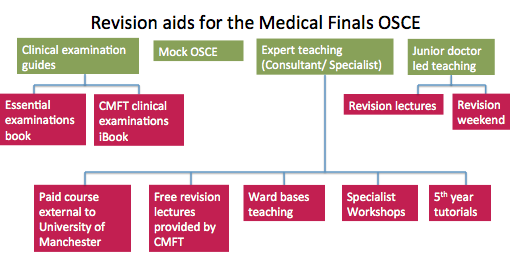



Theme
Clinical Assessment and the OSCE
INSTITUTION
Central Manchester Foundation Trust
Medical students preparing for the medical finals OSCE utilise a variety of sources to aid their revision, ranging from lectures and workshops/tutorials to electronic reasources and Mock OSCEs. The revision aids offered at Central Manchester Foundation Trust allow a multimodal (visual, auditory, read/write, and kinetic) apporach to revision which may be favoured by Undergraduate students1. In many Medical Schools there is ever growing development in electronic interactive learning resources and recognition of the value of near peer assisted learning2. In addition to free revision opportunities provided at CMFT many medical students attended one of more paid revision courses coordinated by companies external to the University of Manchester. It is difficult to reliably assess how significantly a revision resource contributes to exam performance however retrospective student opinion is valuble when trying to improve teaching and revision reasources.

- Mock OSCE was the most highly rated modality; 64.3% of respondents rated it as “essential” and 83.9% as either “essential” or “important”.
- Expert-led small group workshops (covering specialist subjects e.g. dermatology and ophthalmology) were rated as “essential” by 42.2% and as either “essential” or “important” by 71.1%.
- A revision weekend delivered by junior doctors (non-experts) was similarly highly rated (70.3% as either “essential” or “important”).
- Non-exam orientated tutorials held throughout the 5th year, were rated by only 9.4% as “essential” and 46.9% as either “essential” or “important”. 15.6% of respondents cited this modality as having either “no impact” or “little impact” on whether or not they passed their final OSCE.
- All revision aids were rated as 'useful", "important" or "essential" by >75% of students that attended or utilised them.
.jpg)
Aim
The Undergraduate Department at Central Manchester Trust aimed to review student perception of how revision aids contributed to medical finals OSCE revision.
Method
There were 128 students identified that had passed their final OSCE of the MBChB course. We asked these students to anonymously rate the perceived value of a variety of revision strategies in contributing to their success via a retrospective electronic survey. We obtained a response from 64 students.
- The data suggests that mock examinations are highly rated by students preparing for OSCE examinations.
- Small group tutorials lead by both experts and non-experts were highly rated.
- Students in the run up to their examinations do not value un-focused tutorials.
- Students value a range of reasources.
- Near peer revision sessions led by junior doctors may be valued as much as expert-led tutorials, and have the potential to benefit students and junior doctors.
- Mock examinations may be the most valuable revision tool and we propose further research to explore this.
1.Learning styles and approaches to learning among medical undergraduates and postgraduates, L Samarakoon, T Fernando, and C Rajapakse, BMC Medical Educaion 2013, Vol 13, Issue 42
2. Those who can, teach. Assessing medical students’ perception of a finals revision programme delivered by foundation and core trainees: a cross-sectional study, G. Mole and L.Gilespie,
 Send Email
Send Email